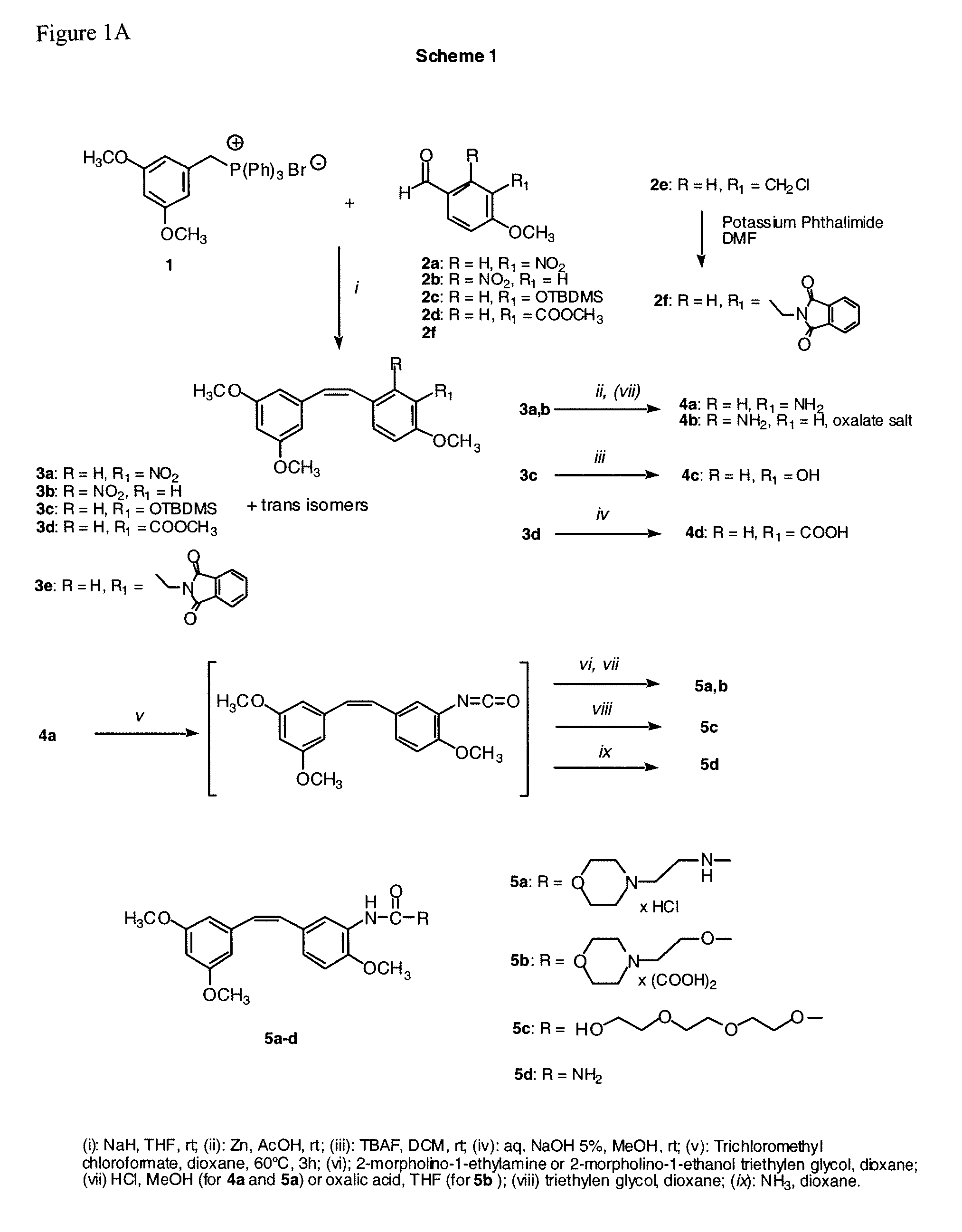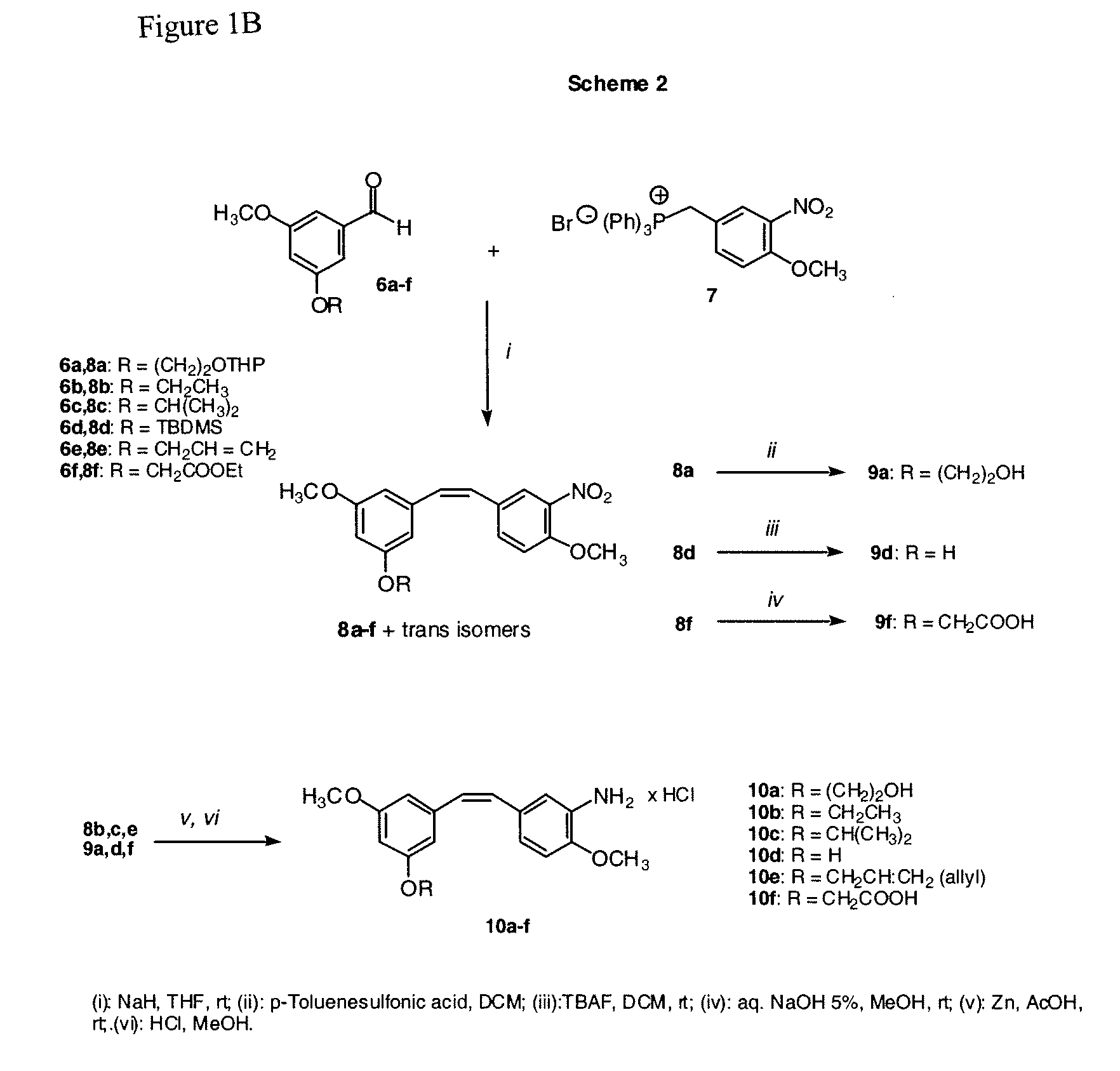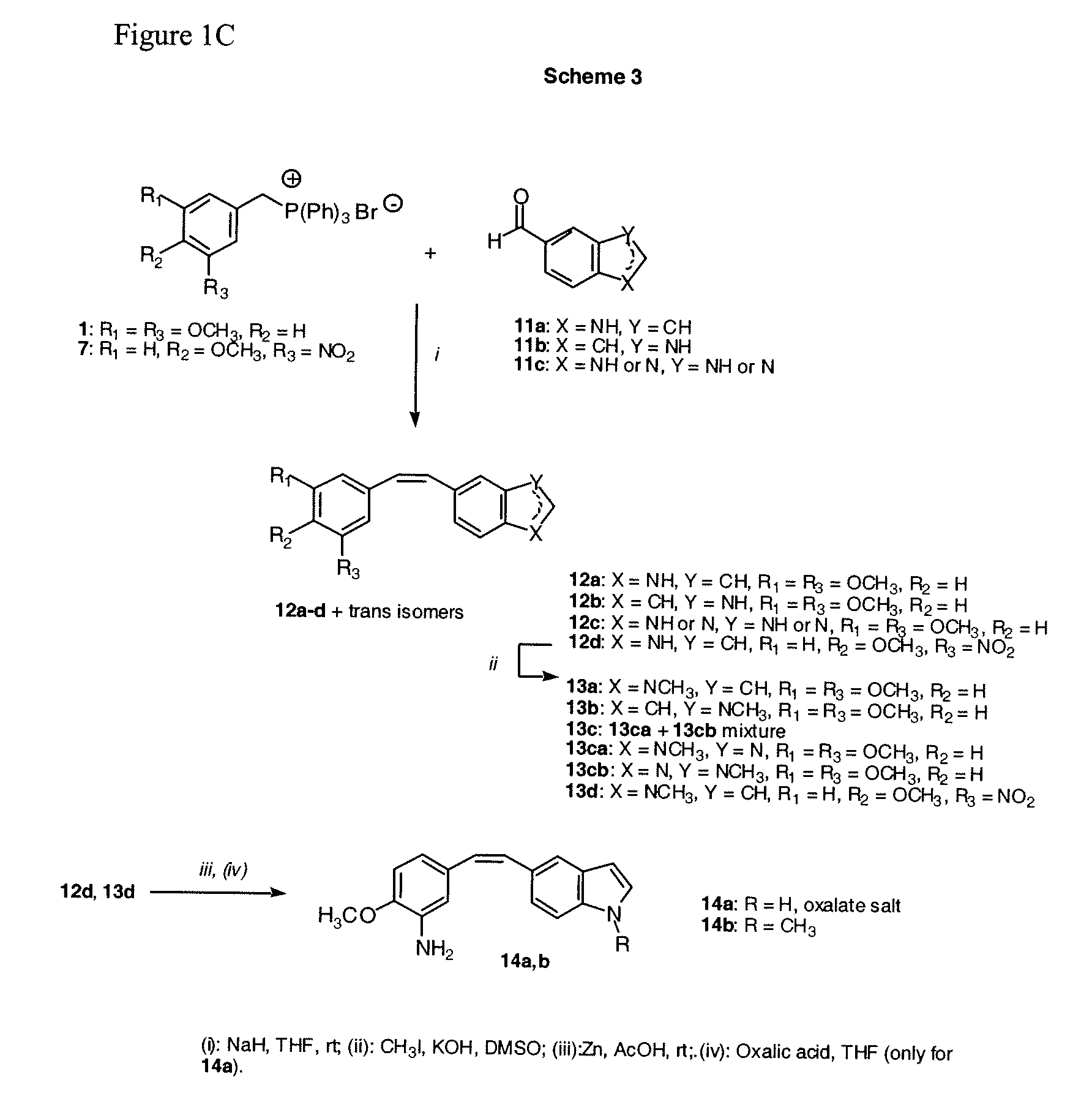Stilbene derivatives as new cancer therapeutic agents
a cancer and derivative technology, applied in the field ofstilbene derivatives, can solve the problems of significant morbidity and mortality, the mechanism of stilbene-induced cell death remains unknown, and compounds targeting the colchicine site are not yet available for clinical application
- Summary
- Abstract
- Description
- Claims
- Application Information
AI Technical Summary
Benefits of technology
Problems solved by technology
Method used
Image
Examples
example 1
[0074]Scheme 1, step i.
(Z)-1-[2-(3,5-Dimethoxy-phenyl)-vinyl]-4-methoxy-2-nitrobenzene (3b)
[0075]The phosphonium salt 1 (3 mmol, 1.48 g) was suspended in 10 mL of anhydrous tetrahydrofuran (THF). The suspension is cooled in an ice bath and then NaH (55% in mineral suspension, (3.4 mmol, 148 mg) is added. After about 30 minutes, a solution of aldehyde 2b (2 mmol, 362 mg) in 5 mL of THF is added. The reaction is stirred at room temperature for 6 h, filtered on a Celite bed, and washed with THF. After solvent evaporation, the residue is dissolved in methylene chloride (20 mL), washed with water (5 mL) and brine (5 mL), dried and evaporated again. The residue is purified by flash chromatography on silica gel (30% Ethyl acetate / light petroleum) to afford the expected cis compound 3b (240 mg), and trans isomers.
[0076]Oil; Yield 38%. 1H NMR (CDCl3): δ 3.62 (s, 6H), 3.86 (s, 3H), 6.21-6.23 (m, 2H), 6.27-6.29 (m, 1H), 6.63 (d, J=12.4, 1H), 6.83 (d, J=12.4, 1H), 6.95 (dd, J=2.6, J=8.6, 1H), ...
example 2
[0081]Scheme 1, step iii.
(Z) 5-[2-(3,5-Dimethoxy-phenyl)-vinyl]-2-methoxy-phenol (4c)
[0082]To a solution of silyl compound 3c (1 mmol, 400 mg) in dichloromethane (15 mL) is added tetrabutylammonium fluoride (TBAF, 1 mmol, 261 mg). The mixture is stirred at room temperature for 2 h, poured into water, and extracted with dichloromethane. The combined organic extracts are washed with brine (5 mL) and dried (Na2SO4). Removal of the solvent under reduced pressure affords a residue, which is chromatographed on silica gel, 40% ethyl acetate / light petroleum to obtain the title compound, 258 mg.
[0083]Oil. Yield 90%. 1H NMR (CDC3): δ 3.69 (s, 3H), 3.92 (s, 3H), 4.95 (br, 1H), 6.28-6.31 (m, 2H), 6.35-6.37 (m, 1H), 6.45 (d, J=12.2, 1H), 6.57 (d, J=12.2, 1H), 6.91 (d, J=8.8, 1H), 7.40 (dd, J=2.2, J=8.8, 1H), 7.75 (d, J=2.2, 1H).
[0084]Anal. (C17H18O4) C, H.
example 3
[0085]Scheme 1, step iv.
(Z)-5-[2-(3,5-Dimethoxy-phenyl)-vinyl]-2-methoxybenzoic acid (4d)
[0086]A mixture of ester 3d (1 mmol, 328 mg), methanol (10 mL), water (6 mL) and lithium hydroxide (1.5 mmol, 36 mg) is allowed to stand at 50-60° C. for 24 h. The solution is concentrated in vacuo to remove methanol, and the remaining aqueous solution is extracted with diethyl ether to separate trace amounts of unreacted ester. The aqueous solution is acidified with 1M hydrochloric acid and extracted with three portions of ethyl acetate (10 mL each). The combined organic extracts are washed with brine (5 mL) and dried (Na2SO4). Removal of the solvent under reduced pressure affords a residue, which is chromatographed on silica gel, 40% ethyl acetate / light petroleum.
[0087]Oil. 299 mg. Yield 95%. 1H NMR (CDCl3): δ 3.68 (s, 6H), 4.04 (s, 3H), 6.35 (t, J=2.0, 1H), 6.37 (d, J=2.0, 2H), 6.52 (d, J=12.0, 1H), 6.58 (d, J=12.0, 1H), 6.87 (d, J=8.4, 1H), 7.45 (dd, J=2.0, J=8.4, 1H), 8.11 (d, J=2.0, 1H), 1...
PUM
| Property | Measurement | Unit |
|---|---|---|
| Water solubility | aaaaa | aaaaa |
Abstract
Description
Claims
Application Information
 Login to View More
Login to View More - R&D
- Intellectual Property
- Life Sciences
- Materials
- Tech Scout
- Unparalleled Data Quality
- Higher Quality Content
- 60% Fewer Hallucinations
Browse by: Latest US Patents, China's latest patents, Technical Efficacy Thesaurus, Application Domain, Technology Topic, Popular Technical Reports.
© 2025 PatSnap. All rights reserved.Legal|Privacy policy|Modern Slavery Act Transparency Statement|Sitemap|About US| Contact US: help@patsnap.com



